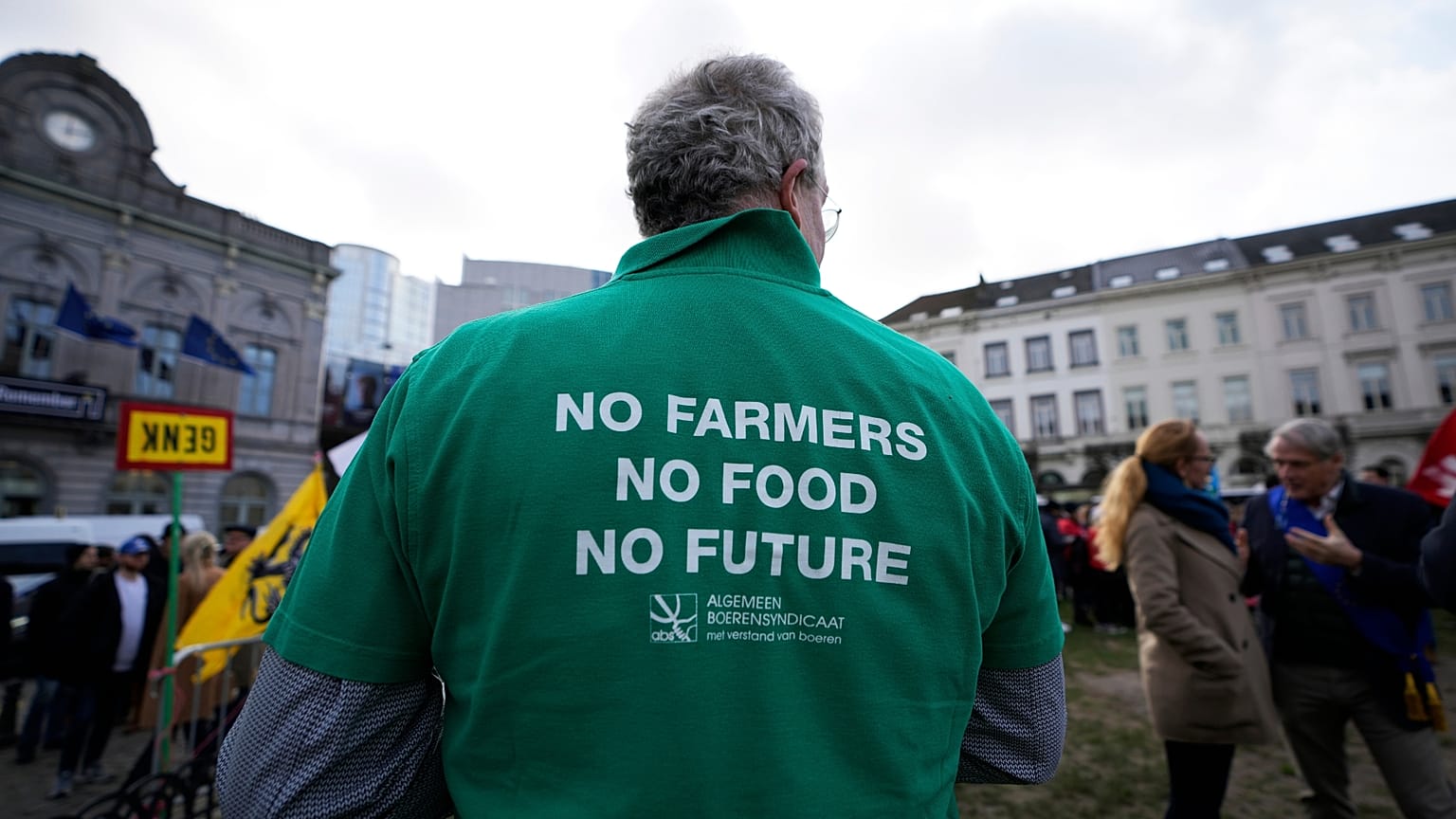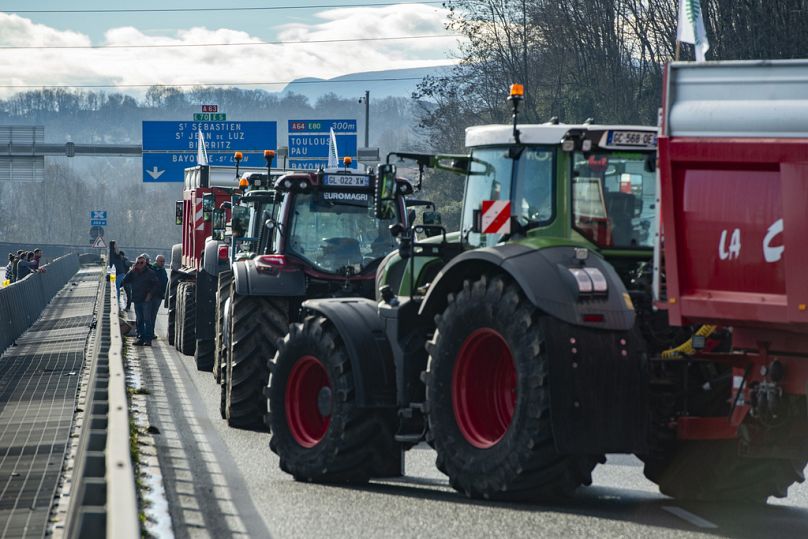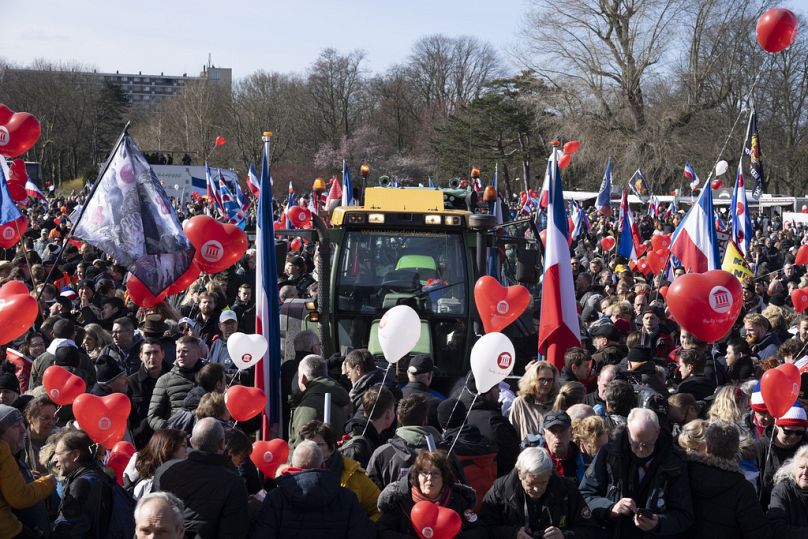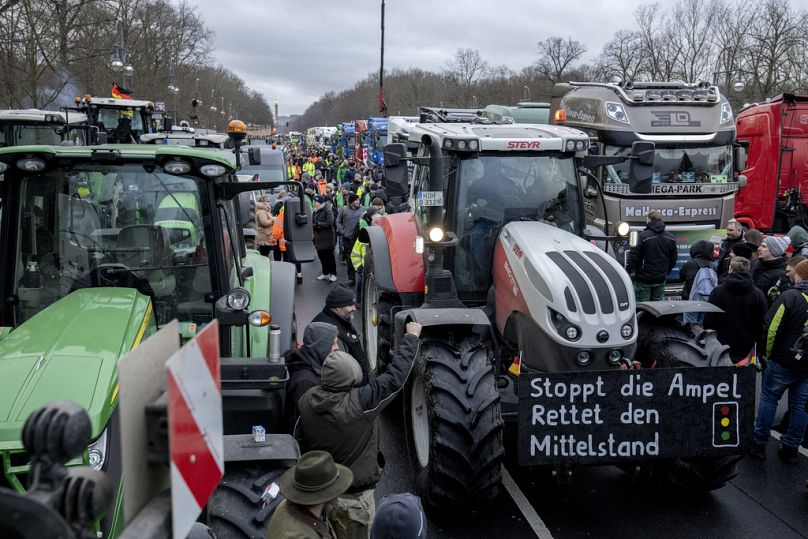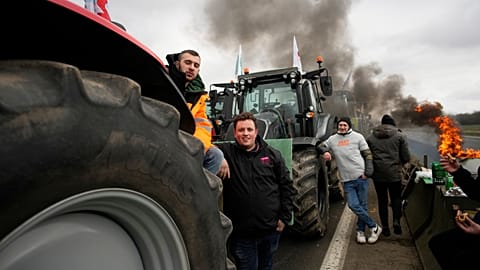Already bearing the brunt of the climate crisis, Europe’s farmers are speaking out against policies they say are contradictory, unfair and leave them worried for the future.
Roads have been blocked across France, manure and agricultural waste dropped outside public offices, and bales of hay spread through fast food restaurants.
 ADVERTISEMENT
ADVERTISEMENT
 ADVERTISEMENT
ADVERTISEMENT
It started last year when farmers began unscrewing road signs and putting them back upside down. They sometimes added the slogan ‘on marche sur les têtes’ meaning ‘we’re walking on our heads’ in reference to their world being turned upside down.
Since then, protests have become increasingly disruptive and were hit by tragedy on Tuesday when a farmer and her daughter were killed and her husband seriously injured in a traffic collision at a protest barricade in the Ariège region of southwestern France.
France’s biggest farmers union, FNSEA, says protests will continue “this week and as long as necessary”. It is considering nationwide action as the movement progresses.
It’s not just France, however. Already facing economic losses from the climate crisis, Europe’s farmers are speaking out against green policies they say are contradictory, unfair and leave them worried for the future.
Why are French farmers angry?
French farmers’ anger stems from a complicated mesh of different policies and funding cuts.
Agricultural diesel was set to get more expensive as subsidies were removed, farmers were facing an extra €47 million per year in fees for water consumption and they say complicated regulations have made it difficult to know what they can or cannot do.
They also object to bans on pesticides and herbicides driven by the EU’s Green Deal and a new EU-wide treaty that could see the import of more Brazilian and Argentinian beef. Farmers claim competing with these countries is extremely hard as they aren’t bound by strict rules on animal welfare.
Further frustration comes with applying for the €9 billion a year in subsidies France receives from the EU. At least one day a week is spent filling out the paperwork for them, according to farmers.
Swathes of contradictory policies, they say, leave the agricultural industry attempting to reduce farming’s environmental impact while also increasing food production. With a declining number of people working to produce the food needed to feed France, many are concerned about the future.
Some of their calls were headed in December when the government rowed back on plans to increase licence fees for pumping groundwater and releasing pesticides. An increase in the price of diesel from removing subsidies has also been suspended and a proposed ban on the controversial weedkiller glyphosate was overturned in attempts to appease the protesters.
After a meeting between the FSEA, the new Prime Minister Gabriel Attal and agricultural minister Marc Fesneau on Monday, head of the union Arnaud Rousseau told French media there would be “no lifting of actions as long as there are no concrete decisions”.
The French government has said it has “heard their call” and on Wednesday told a press conference it would be making announcements in the days to come.
Anger is spreading across Europe
French farmers’ protests have spilled over from neighbouring Netherlands and Germany. There are common concerns about unfair and unpredictable government decisions on agriculture.
Last year, Dutch farmers blocked roads, dumped manure in the streets and protested outside politicians' houses over regulations to cut nitrogen emissions.
As one of the world’s largest agricultural exporters, the industry is responsible for around half of the Netherlands’ total nitrogen emissions. In 2019, the Netherlands’ highest administrative court ruled that the nitrogen permits system was failing to prevent these emissions from harming specially protected nature reserves known as the Natura 2000 network.
Though the initial ruling wasn’t headline news, the government soon said it needed to take “drastic measures” to rectify the situation - including buying out and closing livestock farms.
The sudden announcement of cuts left farmers feeling as though they weren’t being fairly treated. They had already cut nitrogen emissions significantly in the last 30 years and funding for rural areas had been reduced in favour of urban investment.
Previous government policies had encouraged them to expand and now farmers weighed down with debt were being told they needed to reduce the size of their operations.
Protests led to the founding of the right-wing political party BoerBurgerBeweging (BBB) which promised farmers more of a say in agricultural policy. In 2023, BBB won the provincial elections and, following the Senate election, ended up as the party with the highest number of seats in the Dutch Senate.
Anger has also been growing in Germany over plans to phase out fuel subsidies worth up to €3,000 a year for the average business. More long-term resentment over the unfair application of environmental policies has only added fuel to the fire.
Farmers have been taking to the streets since December and on Monday were joined in Berlin by environmental activists. Streets were lined with heavy vehicles.
They say they are supportive of green, genetically unmodified farming - but that needs to come with subsidies or at least fair pricing for the food they produce. It is a sentiment echoed by many taking to the streets across Europe.
Could farming be a major European election issue?
Exasperation has also increased in the east of the EU with protests in Poland, Romania, Slovakia, Hungary and Bulgaria, where farmers have complained about unfair competition from cut-price cereals from Ukraine.
In Romania and Bulgaria, border crossings have been jammed by tractors and trucks. Poland saw the resignation of its agricultural minister last April over the dispute though new subsidies have now somewhat calmed the situation.
There are still lingering concerns for many, however, over excessively high taxes and increasingly tight regulations. As farmers reel from the impact of droughts, floods and wildfires, they claim green policies are only squeezing them further.
Protests could spread even further in the coming weeks with Spain and Italy now poised to join the movement too. On Thursday, the European Commission is due to start strategic talks with farmers’ unions, agriculture businesses and experts as it seeks to put out the fire.
But, as tensions continue to grow, agriculture is setting up to be a major issue across the EU ahead of the European Parliament elections in June.














